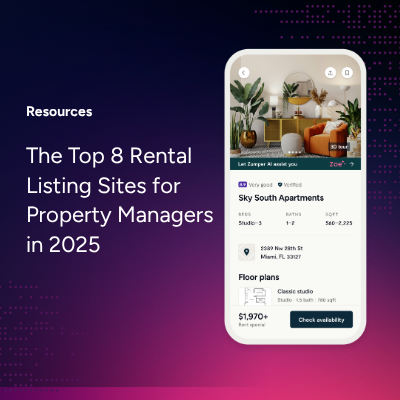
[] As a landlord, you must fulfill certain obligations to your renters. You also need to keep certain things in mind when it comes to maintaining your rental property. This guide to landlord responsibilities will show you some of the key tasks and obligations you need to consider.
1. Keep a warrant of habitability
Maintaining a warrant of habitability is one of the top landlord responsibilities.
Every lease agreement implies a warrant of habitability, whether or not you actually state these words in the lease agreement you create. A warrant of habitability is the right every renter has to have a clean and safe unit. The warrant of habitability is a blanket statement covering the quality and livability of a property, covering things like ensuring the rental unit is fit to live in, free from defects or hazards, and compliant with all building and health codes in your state and local area.
So, what would make a unit uninhabitable? Disruptions to utilities like electricity, plumbing, and water as well as broken doors or windows that pose injury or safety threats are some examples of issues that would render a unit uninhabitable under the law. Unclean conditions that could lead to vermin infestations also fall under this category.
Landlord responsibilities that typically fall under the warrant of habitability include:
- Complying with all health and building codes, including local and state regulations
- Ensuring peaceful, quiet, and hazard-free living conditions
- Keeping a unit responsibly protected from the weather
- Maintaining an environment free from pests
- Maintaining structural components
- Promptly making requested repairs
- Providing necessary electric, heat, and hot and cold water facilities
2. Ensure your renters are safe on your property
Landlord responsibilities include keeping renters safe from crime. For example, you’ll want to provide sturdy locks on all doors and ensure you have lights in dark areas around your property. Taking these simple actions will help improve safety while ensuring your renters actually feel secure in their homes.
You’ll also want to screen potential renters to make sure you’re not renting to anyone who will pose a threat to other people renting at your property. While the Fair Housing Act does not protect individuals with a criminal history, the U.S. Department of Housing and Urban Development suggests landlords consider the severity of the crime as well as the time that has passed since the prospective renter committed an offense.
3. Make necessary repairs
It’s in your best interest to make repairs to issues your renters report as soon as possible. This is especially true if the damage creates a safety hazard or may cause the unit to become uninhabitable. You may face consequences if you neglect repair work.
Though local and state laws vary, renters can withhold some or all of their rent payment in some places if you do not make repairs in a timely manner. Renters may also hire third parties to make needed repairs and then deduct the cost of repair bills from their rent.
At the same time, you must ensure you follow regulations that cover landlords accessing their renters’ units. Only a few reasons exist that allow landlords to enter an occupied unit, such as emergencies. Otherwise, you’ll typically need to give notice of at least 24 hours to enter a unit in order to determine what repairs you need to make or to make those repairs. State and municipality laws vary, so make sure you know exactly what notice you need to give before you enter an occupied unit.
4. Maintain the property
Although not all property defects fall under your responsibilities, maintaining your property will go a long way in attracting quality renters when you post your rental listing. For instance, replacing worn carpeting or dealing with mildew on grout may not technically fall under your absolute responsibilities. That said, if a renter finds the property appears rundown, they may not treat it with respect. Addressing cosmetic issues can help you find and retain good renters.
Simple actions like giving a unit a fresh coat of paint and maintaining the garden area of your property can help you attract quality renters. Those renters will then be more likely to maintain their unit, saving you hassle in the long run.
If renters make requests for repairs or maintenance, you’ll want to react positively or at least explain why you can’t accommodate a given request. Pro-tip: Make sure you keep accurate and up-to-date records of all repairs and maintenance you do to ensure you’re protected if conflicts with renters come up.
5. Give renters advance notice before you raise their rent
Most lease agreements will allow you to increase rent when the lease expires. However, these contracts usually state that landlords need to provide renters with at least 30 to 60 days’ notice before the rent increase occurs. Again, the exact requirements will vary by city and state, so make sure you know the rules in your location.
Additionally, some cities and states have rent-controlled or rent-stabilized units. Laws governing these types of units may include a cap on how much or how often you can raise rent in a given period.
6. Return security deposits promptly
Once a renter moves out of your property, you’ll need to return the security deposit in a timely manner. Again, laws will vary depending on where you are, but most states generally give landlords a window of 30 to 60 days to return the security deposit. Most lease agreements will require you do a final walk-through of the unit to inspect for damage once the renter vacates your property.
All in all, landlord responsibilities cover providing a safe and habitable living environment for your renters. You should be ready to address repairs and maintenance issues, especially those that impact safety or habitability, in a prompt manner. You should also strive to maintain good communication with your renters. Fulfilling your landlord responsibilities will ensure you follow the laws in your area while building a good relationship with your renters.



